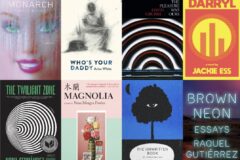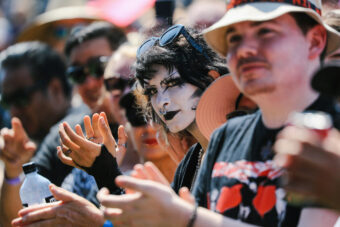Release Date: May 27, 2014
Label: Big Beat/Atlantic
Hercules and Love Affair are structurally no different than many club acts: A producer calls the shots, and adjunct singer/co-songwriter/beat-makers add ever-changing fresh flavors. But there’s a fundamental contrast between Hercules and most current EDM: Andy Butler and cohorts engage with LGBT club culture in a complicated and meaningful way that isn’t about slogans, stylists, and stardom. Instead, Butler curates a living art exhibit about what it means to dance and dream at the sexual margins. Where others obfuscate and dumb down, Hercules aestheticize and elevate.
“Blind” – the act’s devastatingly dramatic and defining 2008 single off its self-titled debut, featuring Antony Hegarty of Antony & the Johnsons – set an absurdly high bar not matched by 2011’s melancholy and Hegarty-free Blue Songs, a well-articulated ripple rather than its predecessor’s unexpected splash. So it’s only fitting that The Feast of the Broken Heart quite consciously hits harder. The orchestral brass, funk bass, and disco percussion that set Hercules and Love Affair apart are reduced to one exquisitely delicate jazz horn chart in soul-stirring closing cut “The Key.” They’re replaced by a streamlined and visceral adaptation of house heyday rhythms Blue Songs rendered fussy.
The exacting historical references that define Butler as an archivist and cultural emissary remain: Tribute is paid to Larry Heard, Cabaret Voltaire, Electribe 101, Baby Ford, MK, Peter Daou, Danny Tenaglia, and others at the crossroads of deep, experimental, and soulful house: “5.43 to Freedom” even showcases the same diss-tossing dialog the Look’s “Glammer Girl” sampled from John Waters’ prototypical shocker Mondo Trasho.
Although Feast comes packed with Europeans and expats (Butler currently calls Vienna home), the rhythms strike with Yankee assertiveness, the vocals now direct yet far more diverse. Husky voiced, Paris-via-Missouri folk/jazz crooner Krystle Warren sings and co-writes “My Offence,” which features the indelible refrain, “My essence is my offence/ Let yourself be/ Cunt, cunt”; as well as the introspective pounder “The Light,” where her Nina Simone-esque pipes get upstaged by initially arresting but ultimately annoying answering machine beeps. Parisian trans soul-ster Rouge Mary offers spiritual guidance in “Think,” while Belgian’s vocally androgynous Gustaph connects the dots on “That’s Not Me” and “Do You Feel the Same” between the ’90s pop-house hits of CeCe Peniston and Robin S and today’s Disclosure.
Yet it’s Denver-born, Reykjavík-based singer-songwriter John Grant who here shines brightest. He sings and plays neoclassical piano throughout “I Try to Talk to You” as if addressing a commitment-weary lover. Below the surface, though, he’s also recriminating himself for not protecting his bloodstream from HIV. “You let them use you good/ Then they turn around and say you’re sick,” he sings, while Butler offsets rueful balladry with uplifting beats. The result suggests a Frankie Knuckles remix of a Nick Drake lullaby and it’s devastatingly grand and true, the kind of record dancers wait all night for. It’s this transformation from hurt to healing that is Hercules’ quest. Butler and Grant achieve it for the lonely and bruised, for they know them well.





